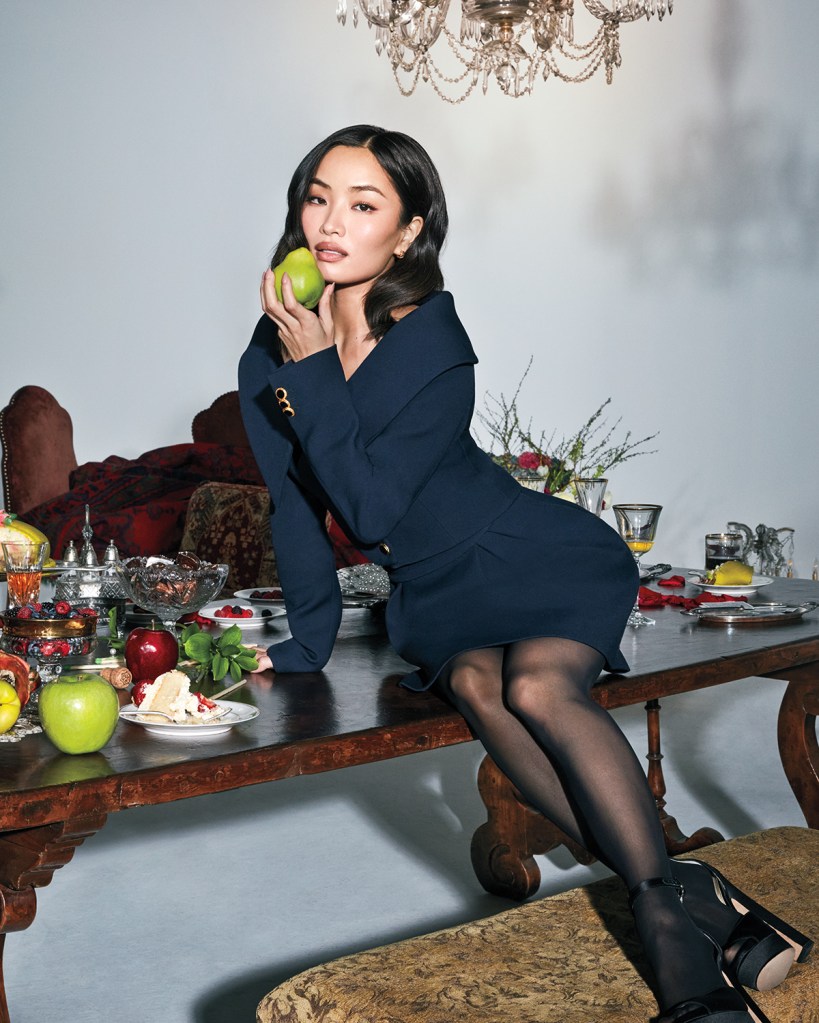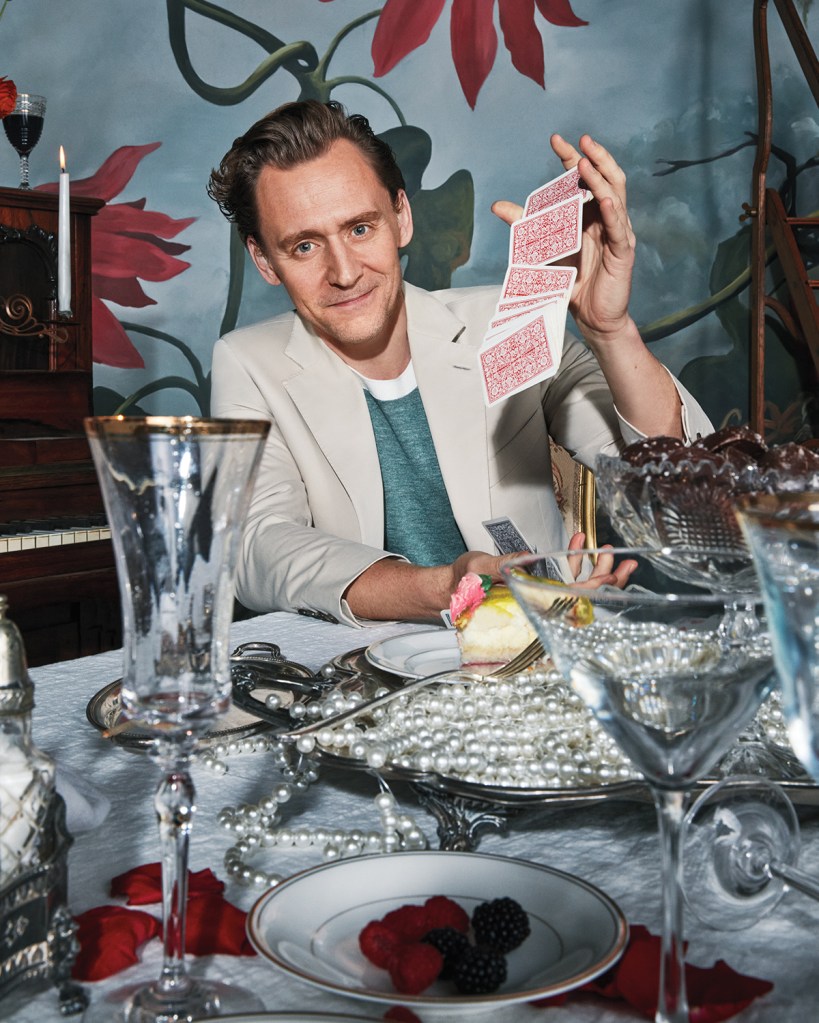Anna Sawai’s enthusiasm is palpable when she sits down with Tom Hiddleston. It’s her first taste of awards season, but Sawai’s stunning performance in FX’s historical epic “Shōgun” as Toda Mariko – the last surviving member of a disgraced samurai clan in Japan feudal – catapulted her into the race. Hiddleston, meanwhile, is a veteran. For nearly 15 years, the Emmy nominee has played Loki, the evil but endearing comic book god, across the Marvel Cinematic Universe, and the second season of Disney+’s “Loki” finds him at the top of his game.
TOM HIDDLESTON: Your work in “Shōgun” is extraordinary. You created Mariko with such care, diligence and love. I found the whole show and your performance extremely touching. I love the metaphor of the eightfold fence – the idea of a private self, hidden within the many selves that we are, that is only for you. I was wondering what your relationship was to this.
ANNA SAWAI: It’s unfortunate that women at the time were forced into situations where they really had to protect themselves. They were not allowed to express themselves and show exactly how they felt. This was easy for me to understand because societal expectations are still very much alive in Japan. Reflecting on my own experiences, I was like, “OK, I know what it’s like. “In the show, we see it as something that’s not as negative as I just explained – it’s more zen, and there’s this beauty in it.
HIDDLESTON: What was the reaction of Japanese women?

Mary Ellen Matthews for Variety
SAWAI: I try not to get emotional. We were on a press tour in Washington, DC, and we showed our first two episodes to a Japanese community. After the screening, several young girls came up to me and said, “This is the first time I’ve seen a real Japanese character that I can really relate to. They would also become emotional, because it was something they had internalized – not being able to speak, having to behave – and they thought this was how they should be.
In Japan, we see characters like that; but in Western media, it was the first time I read a script that made me feel like she wasn’t being sidelined. We saw this vulnerability but also the strength in her. We see her find her voice. I feel like if I had seen characters like Mariko on screen growing up, it would have shaped me in a different way. I would not have internalized all these expectations.
As I watched “Loki,” I realized we shared the same themes: free will, purpose, and sacrifice. I didn’t expect it, but I shed tears watching your show.
HIDDLESTON: I always saw Loki as a broken-hearted, broken soul, deeply damaged by the fact that he was unwanted. He’s mischievous and playful on the surface, but that masks all that pain. What I loved about this series was getting to that vulnerable soul and healing that damage. Showing that pain can be transformed into courage and strength – what does this have to do with you?
SAWAI: For most of this show, we see her very calm and contained. I thought of it more as letting go. Because that’s what she always wanted to do but couldn’t do because she’s a woman. But in the end, she is able to achieve her goal, reclaim her identity, end her father’s fight, and get what she always wanted: follow in her family’s footsteps.
HIDDLESTON: So perhaps the sacrifice is the last moment of her self-definition?
SAWAI: Exactly. For Loki, all he wanted was to be with his friends; yet, he chooses to be alone, so that they can continue to live. The last line you have, which is…
HIDDLESTON: “I know what I want. I know what kind of god I need to be – for you. For all of us.”
SAWAI: It is so beautiful. Who thought of that?
HIDDLESTON: Our brilliant directors found me and said, “What do you think you would like to say?” » I remembered that at the end of “Thor,” the last thing he says is, “I could have done it, Father – for you.” For all of us.” It’s full of need, desperation, longing for acceptance and misguided intentions. It’s full of his own broken heart. I thought, “I wonder if I should repeat that ?But it has a completely different meaning, full of love, sacrifice, selflessness and generosity.
This is very similar to what Mariko is experiencing. It is a moment of liberation and the clarity of defining your own identity in sacrifice. In his last moment, he becomes free to act. He decides what his life has been like so far. His last statement is full of deep love and generosity. That the journey of a thousand miles has brought us here. It was very satisfying and emotional for me too, because it has been such a long journey.
HIDDLESTON: When the time came, how did you say goodbye to Mariko?
SAWAI: I didn’t have time to say goodbye. I packed up, went back to my apartment in Vancouver, slept eight hours, woke up and went to my next job.
HIDDLESTON: Oh my. What was?
SAWAI: “Monarch: Legacy of Monsters.” (Sawai plays Cate, a science teacher searching for her father, in the Apple TV+ series.) I remember walking on set and having my hime bangs, the Mariko haircut. We were trying to trick it so they couldn’t see it. But I really didn’t have time to do anything to really say goodbye. Getting into this new persona helped me move on from her. I don’t know if I would do it again.

Mary Ellen Matthews for Variety
HIDDLESTON: Did you get to the weekend and then say, “Wait, who am I?” What is my name?”
SAWAI: When I woke up, I was like, “Okay, I guess my name is Cate now.” »
HIDDLESTON: Did Cate feel radically different? Was it like a vacation?
SAWAI: Oh yeah. You wear normal clothes and walk normally. You don’t have to study how to hold a cup. I mean, you played Loki for 14, 15 years. How to say goodbye?
HIDDLESTON: I just felt this sense of relief because it had been a very meaningful experience. That feeling of…exhaling.
SAWAI: Do you still carry some of him?
HIDDLESTON: Always. It changed the entire course of my life, without a doubt.
SAWAI: In Japanese, you would say “Otsukaresama deshita”, which is what you say at the end of the work. It’s like, “Thank you for your hard work. »
HIDDLESTON: How to say that? (She repeats it and he repeats it perfectly.) Beautiful. I’ll take this with me.
Design and production: Keith Raywood